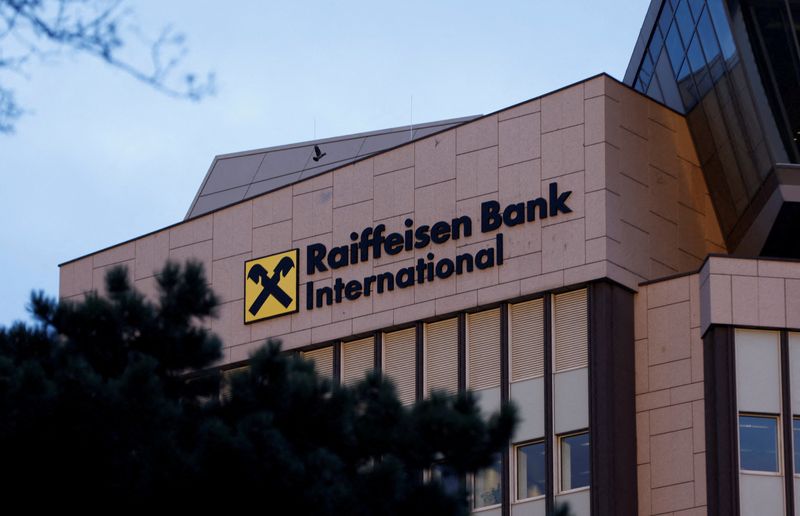By John O'Donnell and Alexandra Schwarz-Goerlich
FRANKFURT/VIENNA (Reuters) -Raiffeisen Bank International was warned by the U.S. Treasury in writing that its access to the U.S. financial system could be curbed because of its Russia dealings, according to a person who has seen the correspondence.
On May 6, Deputy Secretary of the Treasury Wally Adeyemo sent a letter to RBI, expressing concern about RBI's expansion in Russia as well a $1.5 billion deal with a sanctioned Russian tycoon that the bank has since aborted, according to the person, who requested anonymity because the matter is private.
While the deal linked to Oleg Deripaska was ditched by Raiffeisen days after the letter arrived, the source said that U.S. Treasury's concerns over Raiffeisen's business in Russia remain.
The warning is the strongest yet to the biggest Western bank in Russia and follows months of pressure from Washington, which has been looking into the Austrian lender's business in the nation for more than a year.
It underscores the deep frustration in Washington with the Austrian bank despite its recent decision to ditch the deal that had exacerbated those tensions.
Reuters reported in March about strong U.S. opposition to the Deripaska transaction, which Raiffeisen had billed as a means of unlocking some of its funds stranded in Russia.
Raiffeisen shares dropped 3% as trading opened, making it the top loser among European banks.
A spokesperson for Raiffeisen said that it had walked away from the deal and had not entered into any such transactions.
The spokesperson said RBI had "significantly reduced" activities in Russia and taken broad measures to mitigate the risks from sanctions.
"RBI will continue to work towards the de-consolidation of its Russian subsidiary," the spokesperson told Reuters.
In the letter, Adeyemo, the U.S. Treasury's second-highest ranking official, said Raiffeisen's extending activities would contradict assurances RBI had given to the Treasury that they were trying to wind down in Russia, according to the source.
Adeyemo warned that RBI's actions increased the risk of Treasury taking action to restrict its access to the U.S. financial system given concerns that its behaviour put U.S. national security at risk.
PILING PRESSURE
The United States is the world's most powerful regulator chiefly because it can sever a bank's access to the dollar, a cornerstone of international finance. Losing access to the dollar would be likely to plunge any bank into a crisis.
In the letter, Adeyemo also made reference to U.S. President Joe Biden's Executive Order authorizing U.S. secondary sanctions on foreign financial institutions that conduct significant transactions involving Russia's military-industrial base.
The warning piles more pressure on Raiffeisen, a critical financial bridge for Russian individuals and companies to the West, giving them access to euros and dollars.
Vienna remains a hub for cash from Russia and its former Soviet neighbours and Austria maintains close ties with Russia through critical gas pipelines and finance.
RBI had intended to spin off its Russian business, which provides a payment lifeline to hundreds of companies there, after coming under pressure from international regulators. But two years into war, little has changed.

Russian authorities had made it clear to RBI, which has around 2,600 corporate customers, 4 million local account holders and 10,000 staff, that they wish it to stay because it enables international payments, one source has told Reuters.
Although Italy's UniCredit also has a business in Russia and is similarly reluctant to leave, RBI is far larger and has become a test of western resolve to end ties with Russia.